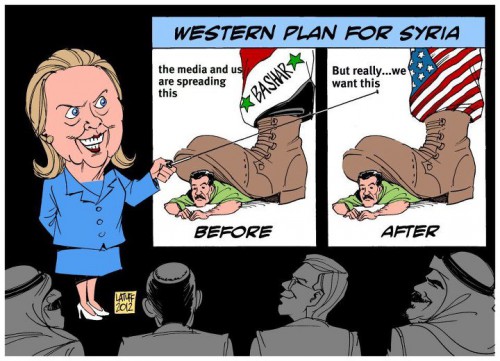vendredi, 27 septembre 2013
US Plan for Syria

US Plan for Syria: Islamist Government without Chemical Weapons
|
Ex: http://www.strategic-culture.org |
|
There is no evidence so far for an American master plan. But a possible logic behind Washington’s drawback on bombing Syria need not be good news. Just remember the latest events in the Syrian crisis. It took some months of negotiations between the United Nations and Damascus to send a couple of UN inspectors to observe the use of chemical weapons. In March 2013 international media for the first time covered a story of dead bodies killed by chemical weapons near Aleppo. On the 18th of August 2013 UN-inspectors landed in Damascus, three days later some Saudi-Arabian television broadcasters reported about thousands of dead bodies, killed by gas. USA, Great Britain and France immediately asked for punishment and did not let any doubt, whom they blamed for the killing. The UN inspectors, after some days of delay, visited the affected area in a suburb of Damascus. Right after this moment international politics accelerated: Obama saw the “red line” crossed he had drawn before and announced a military strike against Syria. Cameron, Hollande and Erdogan stood at order arms. Putin and Lavrov on the other side pulled out all the stops they could. Indirectly they threatened to deliver the last lacking components of the S-300-defence system to Assad. And they guided US secretary of state, Kerry – as it was reported in the Western media –, on the slippery diplomatic banquet, where he allegedly found himself trapped. When Kerry by incident mentioned during a press conference Washington would redraft its plans on bombing Syria, if Assad disarmed his chemical weapons totally, Lavrov took him at his words and immediately proposed a roadmap for disarmament. Washington since then – temporarily – abandoned plans for a military aggression. What, if Kerry did not open the agenda on Syrian chemical disarmament by incident? What, if he was very conscious on what he said at a press conference on the 9th of September? If it was not for the sake of seeking a peaceful solution for the region, but on the contrary, because he had a concrete plan to reshape the Middle East and install an Islamist post-Assad government? The master plan could be the following: Washington can no more count on a liable, secular, and Western orientated opposition, therefore the relative strength between Islamist and civil opposition changed too much on the ground and in exile. Also the Libyan experience showed that there is no way to run a state with Western orientated political groups in the overheated actual political situation of Arab uprisings. Washington seems to be condemned to live with Islamist allies. The Russian alternative for Syria, to support Assad and/or his Alevi successors, is out of question for the USA, because all its allies in the region, from Saudi-Arabia to Qatar and Turkey bet on the Sunni horse, no matter how revengeful and radical the Sunni “freedom fighters” may be. A reshaped Middle East that Washington is striving for is based on three pillars: economic transformation, geopolitical advantage and regime change. At first Washington has in mind the complete economic transformation towards a totally open-market with no obstacles for foreign investment, like Assad did for some parts of the economy – but far too slowly and too cautiously for foreign capital needs. By the way: the tremendous damages caused by the war additionally open opportunities for American investors in the forthcoming period of reconstruction. As important as the economic question is the geopolitical one. The Syrian harbour of Tartus with its Russian military port is a constant thorn in America’s flesh. Tartus is the only place, where Russian Navy has an anchorage ground in the Mediterranean. And the third goal of the American master plan is the usual one: regime change. Regime change was one of the driving forces for US interventions from Afghanistan to Yugoslavia and from Iraq to Libya to guarantee the economic and geopolitical transformation Washington is heading for. But regime change in Syria is not as easy as it looked like in the beginning of the conflict. The mentioned interests lead us to the hypothesis that the – temporary – abstinence of a US military strike against Assad could be beneficial for Washington. Radical Islamic, jihadist groups in government may not be the best choice for Obama, but when America disposes them from chemical military capacities, their future reign in Syria will no more represent a danger for the USA – and for Israel. Seen under this aspect, US stepping back from a military strike for the moment does not aim at a peaceful solution, at good relations to Russia, or at giving up the plan for a regime change. On the contrary: Regime change could become less risky for Washington… All the more if Washington, as it is the case, controls itself or via its allies quality and quantity of the future armament of an Islamic power in Damascus. And one thing seems to be for sure: A pretext to intervene militarily into Syria to get rid of Assad and make the master plan come true can be found at an easy occasion. Vienna |
00:09 Publié dans Actualité | Lien permanent | Commentaires (0) | Tags : politique internationale, actualité, géopolitique, états-unis, levant, syrie, proche orient |  |
|  del.icio.us |
del.icio.us |  |
|  Digg |
Digg | ![]() Facebook
Facebook



Les commentaires sont fermés.